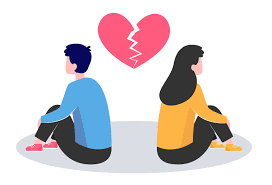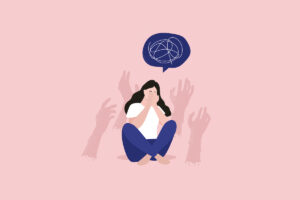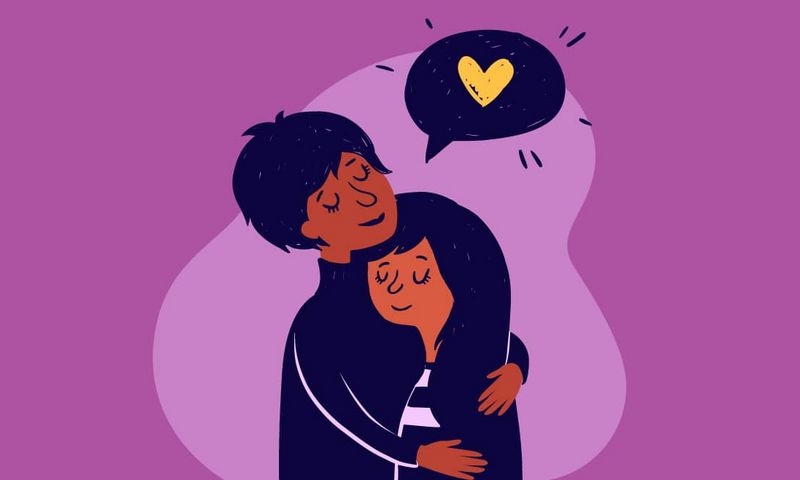Are you someone who often feels anxious in relationships? Do you feel like you can’t quite put your finger on why, but something just doesn’t feel right? If so, you’re not alone. Anxiety in relationships is a common problem, but it can be managed with some simple strategies. In this blog post, we will explore what anxiety in relationships is, how to recognize it, and how to manage it.
Contents
- 1 Defining Anxiety
- 2 Anxiety In Relationships
- 3 Causes Of Anxiety In Relationships
- 3.1 History of being betrayed or abandoned
- 3.2 Intimacy issues
- 3.3 Control issues
- 3.4 Fear of being rejected or hurt
- 3.5 Low self-esteem or feelings of inadequacy
- 3.6 Unresolved issues from past relationships
- 3.7 Experiencing trauma or abuse
- 3.8 Different attachment styles
- 3.9 Having high levels of stress in other areas of life
- 3.10 Suffer from clinical anxiety or another mental health condition
- 4 Recognizing Anxiety In Relationships
- 5 Impact Of Anxiety On Relationships
- 6 Dealing With Relationship Anxiety
- 7 Conclusion
Defining Anxiety
Anxiety is defined as a feeling of worry, nervousness, or unease about something with an uncertain outcome. It’s important to note that anxiety is different from fear, which is a response to a specific threat. When you feel anxious, you may not even be sure what it is you’re worried about. This can make anxiety very confusing and frustrating, both for the person experiencing it and for their partner.
Anxiety In Relationships

When it comes to relationships, anxiety can play a significant role. For some, anxiety can be a normal and even healthy part of the relationship. It can provide the motivation to pursue goals and keep things exciting. However, for others, anxiety can be overwhelming and lead to problems in the relationship.
Anxiety in relationships often manifests itself as clinginess, neediness, or constant checking-in. It may also show up as jealousy, controlling behavior, or hypersensitivity to criticism. If you notice any of these behaviors in yourself or your partner, anxiety may be playing a role.
For some people, it may be feeling constantly on edge, or like they’re waiting for the other shoe to drop. Others may feel like they’re never good enough, or that their partner is always disappointed in them. It can also show up as jealousy, possessiveness, or controlling behavior. If you’re not sure whether or not you have anxiety in your relationship, ask yourself if you often feel:
- Worried about your partner’s reactions to things you say or do
- Afraid of being abandoned or rejected by your partner
- Troubled by constant doubts about your relationship
- Unable to relax or enjoy yourself when you’re with your partner
If you answered yes to any of these questions, anxiety may be affecting your relationship.
Causes Of Anxiety In Relationships

Several different factors can contribute to anxiety in relationships. One common cause is a lack of trust. If you don’t feel like you can trust your partner, it can lead to feelings of insecurity and anxiety. Other causes include:
History of being betrayed or abandoned
This could be from previous relationships or even from your family of origin. If you’ve been hurt in the past, it can be difficult to let yourself trust someone again. Facing constant rejection tends to make an individual paranoid, which can later find its way into one’s romantic relationships.
Intimacy issues
Some people may have a fear of getting too close to their partner. This can be due to a fear of being rejected or abandoned, or simply a fear of being vulnerable. Fear of intimacy can come from a variety of experiences, such as being raised in a dysfunctional family or having had a traumatic experience.
Control issues
For some people, anxiety may be caused by a need to control their partner. This could be due to insecurity or mistrust, or it could be a sign of larger issues such as jealousy or possessiveness. If you find yourself needing to control your partner’s behavior, it’s important to explore what is driving that need.
Fear of being rejected or hurt
This is a common cause of anxiety in relationships. We all have a fear of being rejected by the people we care about. This can be especially true if you’ve been hurt in the past. Not wanting to face these things from the person you like can lead to anxiety.
Low self-esteem or feelings of inadequacy
If you don’t feel good about yourself, it can be hard to believe that your partner loves and values you. This can lead to anxiety about the relationship, as well as feelings of insecurity and worthlessness. One may constantly feel insecure and unworthy or even feel like their partner deserves someone better.
Unresolved issues from past relationships
If you haven’t resolved the issues from your past relationships, it can lead to anxiety in your current relationship. This is because you may be afraid of repeating the same mistakes. If one is still carrying that emotional damage in the present, it can result in the projection of insecurities on your new partner.
Experiencing trauma or abuse
If you’ve experienced trauma or abuse, it can be difficult to feel safe and secure in any relationship. Trauma can cause a person to feel like they’re constantly in danger, which can lead to anxiety, fear, and mistrust. A person may live in the threat of their current partner doing the same things with them, further causing a rise in anxious thoughts.
Different attachment styles
Attachment theory is a way of describing how people relate to others. There are four different attachment styles: secure, anxious-ambivalent, dismissive-avoidant, and fearful-avoidant. Each style is associated with different behaviors and ways of relating to others. Mostly, people with the anxious-ambivalent and fearful-avoidant are prone to developing anxious thoughts regarding their relationships.
Having high levels of stress in other areas of life
If you’re under a lot of stress in other areas of your life, it can lead to anxiety in your relationships. This is because you may have less energy and patience for dealing with relationship issues. Issues like not giving enough time, lack of communication, financial disparities, sexual differences, jealousy, among other things.
Suffer from clinical anxiety or another mental health condition
If you suffer from clinical anxiety or another mental health condition, it can affect your relationships. This is because your symptoms may make it difficult to relate to others healthily. Some common disorders that can cause disruptions in everyday life are ADHD, bipolar disorder, and clinical depression, among other things.
Recognizing Anxiety In Relationships

If you’re not sure whether or not anxiety is playing a role in your relationship, there are some signs to look for.
- Your partner is always critical of you
Do they point out your flaws and criticize your choices? This could be a sign that they’re not feeling secure in the relationship.
- You’re always worried about what your partner is thinking
Do you spend a lot of time trying to guess what they’re thinking or feeling? This can be a sign that you’re anxious about the relationship.
- You feel like you have to walk on eggshells around your partner
Do you feel like you have to watch what you say or do around your partner? This can be a result of feeling like you have to tiptoe around their moods.
- You avoid conflict at all costs
Do you go out of your way to avoid conflict? This can be a sign that you’re anxious about arguing or facing rejection.
- You’re always trying to please your partner
Do you feel like you have to do everything right in order to keep them happy? This can be a result of anxiety and low self-esteem.
- Your partner is never happy with anything you do
Do they always find something to complain about? This could be a sign that they’re not feeling fulfilled in the relationship.
- You’ve started to withdraw from your friends and family
Has your social life suffered since being in the relationship? This can be a sign that you’re putting all of your energy into the relationship, at the expense of other areas of your life.
- You’re constantly worried about the relationship
Do you find yourself worrying about the relationship all the time? This can be a sign that you’re feeling insecure or anxious about where things are going.
- Your partner is always threatening to break up with you
Do they use ultimatums or threats in order to control you? This is a serious issue and it’s not healthy for either of you.
If you notice any of these signs, it’s important to talk to your partner about your concerns. It’s also a good idea to see a therapist, who can help you manage anxiety and improve your relationship.
Impact Of Anxiety On Relationships
Anxiety can have several negative effects on relationships.
- When one partner is anxious, it can lead to tension and conflict. This is because anxiety can cause you to behave in ways that are disruptive or even abusive.
- Anxiety can also lead to communication problems. This is because anxious people often have difficulty expressing their needs and communicating assertively.
- Constant anxiousness can also make it difficult to trust your partner. This is because you may feel like they’re always judging you or looking for ways to hurt you.
- Finally, anxiety can make it difficult to enjoy intimacy. This is because anxiety can cause erectile dysfunction, performance anxiety, and body image issues.
If you’re struggling with anxiety in your relationship, it’s important to seek help from a therapist or counselor. They can help you learn how to manage your anxiety and improve your relationship.
Dealing With Relationship Anxiety
Although it is difficult to manage, there are various ways to help you and your partner navigate through these issues. It can either be through professional intervention or by adopting self-help strategies.
Professional Help
One way to deal with relationship anxiety is to seek professional help. This involves going to see a therapist or counselor who can help you learn how to manage your anxiety.
There are various kinds of interventions that a counselor may use to work on relationship anxiety. These include:
Cognitive-behavioral therapy: This type of therapy can help you identify and change the negative thoughts and behaviors that contribute to anxiety. It can also help you learn how to manage stress and cope with difficult emotions.
Systemic therapy: This type of therapy focuses on the relationship as a whole, rather than just the individual. It can help you identify and change the patterns of behavior that are contributing to anxiety.
Couples counseling: This can help you and your partner learn how to communicate better and resolve conflict. It can enhance honest communication, boundary formation, and conflict management skills.
Systematic desensitization: This is a technique that can help you gradually expose yourself to the things that trigger your anxiety. This can help you develop a more positive attitude towards these triggers and eventually reduce your anxiety.
Relaxation techniques: These techniques can help you manage anxiety by teaching you how to relax your body and mind. These include the use of deep breathing, progressive muscle relaxation, and visualization.
Medication: In some cases, anxiety can occur by a chemical imbalance in the brain. If this is the case, your doctor may prescribe medication to help correct the imbalance. Some common medicines include antidepressants, anti-anxiety medication, and beta-blockers.
Self Help Tips

There are also various self-help strategies that you can use to deal with relationship anxiety. These include:
Identifying your triggers: This involves becoming aware of the things that trigger your anxiety. Once you know what these triggers are, you can start to work on avoiding or managing them.
Learning how to relax: This involves learning different relaxation techniques that can help you calm your body and mind when you’re feeling anxious.
Developing a support network: This involves surrounding yourself with people who understand and support you. These people can provide emotional and practical support when you’re struggling with anxiety.
Setting boundaries: This involves learning how to say no to things that you don’t want to do. This can help you avoid situations that trigger your anxiety.
Making lifestyle changes: This involves making changes to your diet, exercise, and sleep habits. These changes can help improve your overall health and well-being.
Exercising: Exercise can help reduce stress and anxiety. It can also help improve your mood and energy levels. It also helps you sleep better.
Eating a healthy diet: Eating a healthy diet can help improve your mood and energy levels. It can also help you manage weight gain, which can be a common side effect of anxiety medication.
Talk to your partner: Lastly, talking to your partner about your anxiety can help them understand what you’re going through. It can also help them learn how to support you.
Both professional help and self-help strategies can be effective in dealing with relationship anxiety. It’s important to find the approach that works best for you. If you’re not sure where to start, talking to your doctor or a mental health professional can be a good first step.
Conclusion
Managing relationship anxiety can be difficult, but there are various ways that you can seek help. If you’re struggling to manage your anxiety, it’s important to seek professional help or adopt self-help strategies. These strategies can help you learn how to manage your anxiety and improve your relationship.
For more information, please contact MantraCare. Anxiety is a common mental health condition characterized by persistent feelings of worry, fear, and apprehension. If you have any queries regarding Online Anxiety Counseling experienced therapists at MantraCare can help: Book a trial Anxiety therapy session


